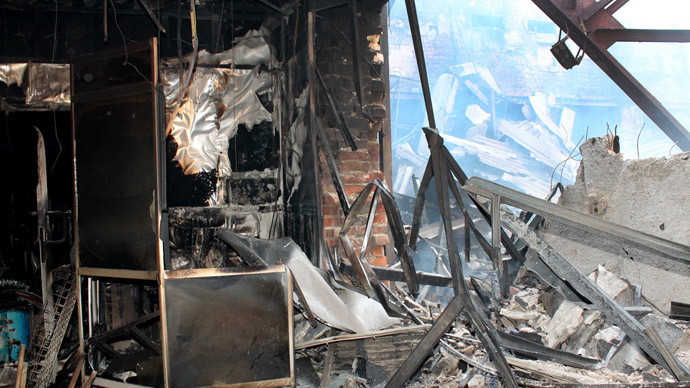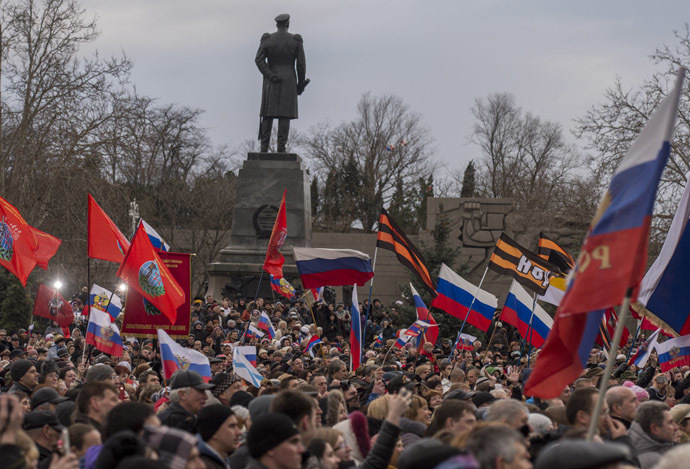British view of the Russian foreign policy: Misunderstanding or distortion?

When one listens to what British officials and media pundits have to say about Russia's policy towards Ukraine, it is hard not to wonder if it is a simple misunderstanding or a deliberate distortion of facts.
The public in this country is intentionally led to believe that it is Russia that violates the territorial integrity of Ukraine and intends to occupy and absorb Eastern Ukraine. Moreover, last year's democratic choice of about 1.5 million Crimeans (more than 96 percent of the peninsula’s population) to join Russia is smeared as “sham” referendum. So let us be clear: this interpretation couldn't be farther from reality.
Let’s start with Crimea. For a number of historical reasons the overwhelming majority of Crimean residents are predominantly of Russian origin. They have always identified with the Russian nation; the local community constitutes an important part of the Russian-speaking world and has close ties with the rest of Russia. For 24 years Crimea was part of sovereign Ukraine. Until the events of late 2013-early 2014, the Crimeans lived a normal life in a normal country. But the violent coup in Kiev staged with Western acquiescence has led to the rise of radical Ukrainian nationalism, intolerance, and anti-Russian hysteria. Parts of the country were rampant with constitutional abuse, street riots, and sieges of administrative buildings, police stations and military units. From the very beginning the people of Crimea chose to disassociate themselves decidedly from what was happening elsewhere in Ukraine, insulted by the anti-Russian rhetoric of the Maidan leaders and activists, alarmed by their calls to “hang Ruskies” and protested against illegitimate installation of a new leadership.
The advent of the new regime was marked by a severe lack of democracy; certain developments posed a direct threat to the well-being of Russian-speaking inhabitants of Crimea: two days after the coup d’état the Verkhovna Rada legislated to abolish the 2012 Law on the Fundamentals of the State Language Policy, which preserved the right of ethnic minorities to use their native languages. Peaceful anti-Maidan protesters from Crimea were brutally assaulted.
As a result, some Ukrainian citizens that have never really belonged to their country culturally and psychologically have lost their hope of finding protection from their newly-installed government and faced the choice of becoming an oppressed minority or severing their ties with the hostile regime to secure a future for themselves and their children.

The decision to hold a referendum was made by the legitimate local authorities, the independence of Crimea was proclaimed and an appeal to enter the Russian Federation was made based on the indisputable results of the popular vote. Standards of international law were fully observed as the right of nations to self-determination enshrined in the UN Charter was exercised freely by the Crimeans. Crimea was recognized as an independent and sovereign state by Russia and on 18 March 2015 in Moscow the two countries signed a Treaty of Unification, under which the Republic of Crimea and the city of Sevastopol became two new subjects of the Russian Federation. Events in Donetsk and Lugansk regions in Eastern Ukraine, brutal mass murder of innocent protesters in Odessa on 2 May 2014, suppression of freedom of the press and other human rights violations in Ukraine prove that the Crimean residents chose the only way to preserve safety and peace in their land.
The Russian Government’s position on Eastern Ukraine is very clear: Donbass is an integral part of Ukraine, there is no dispute on that. The civil war in this part of the country is a result of the anti-state, anti-constitutional takeover that eventually led to a sharp resistance on the territory of Ukraine. As of today, Russia calls upon all parties to comply with all the agreements reached in Minsk and work to achieve their full implementation. Russia cannot do it unilaterally. We keep hearing the same thing repeated like a mantra that Russia should influence the southeast of Ukraine. We are making such efforts. But it is impossible to resolve this problem through our influence on the southeast alone. There has to be a pressure on the current official authorities in Kiev, something we cannot do. This is a road our Western partners have to take– those in Europe and America. At the moment we do not see enough of this effort.
We have also a clear view of what needs to be done to resolve this crisis. Firstly, a constitutional reform in Ukraine that provides for decentralization as a key element should be carried out. Secondly, the law passed earlier on the special status of Lugansk and Donetsk should be enacted. It was passed, but still not acted upon. This requires a resolution of the Rada– the Ukrainian Parliament, which is also covered in the Minsk agreements. Kiev has to move from current manipulations to real action. Thirdly, an amnesty should be ensured by enacting the law prohibiting the prosecution and punishment of persons in connection with the events that took place in certain areas of the Donetsk and Lugansk. It is impossible to have a political dialogue with people who are threatened with criminal persecution. And fourthly, the law on municipal elections should be passed as well. All this is spelled out in the Minsk agreements and all this should be done with the consent of Donetsk and Lugansk.
Unfortunately, we still see no direct dialogue between Lugansk, Donetsk and Kiev. The economic recovery of these territories has not yet been started. If the current authorities in Kiev believe that this is their territory inhabited by Ukrainian citizens, who have the right to receive, say, disability benefits or pensions they earned under the existing Ukrainian law, the Kiev authorities cannot refuse to pay, they simply have no right to refuse. All this has to be done, and not in words, but in practice.
Russia is not redrawing borders in Europe. We do not sow fear among neighbors. It is a pity that even on an official level there are attempts to mislead public opinion and to base policy on false pretexts as it was in Iraq and some other countries in the Middle East and now in Ukraine.
The statements, views and opinions expressed in this column are solely those of the author and do not necessarily represent those of RT.
The statements, views and opinions expressed in this column are solely those of the author and do not necessarily represent those of RT.













